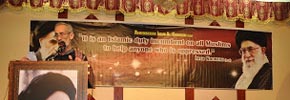That Jian
Sima Sahar Zerehi – It’s no secret, I don’t like Jian Ghomeshi, never have. I mean, I’m a devoted listener of his award-winning CBC radio show Q, I follow his writing in the Globe, Star and National Post, I even have a few of the songs from his former band Moxy Früvous on my iPhone’s playlist, but ultimately Jian irks me.
I’m one of those people who publicly feigned outrage at Billy Bob’s treatment of Jian, but secretly rejoiced, because in my book, Jian had it coming.
You see, in my house Jian is “that Jian” who has done all the things my parents want me to do, minus getting a PhD. Jian and his constantly advancing career have been a dark specter on Iranian-Canadians of my generation. He’s the golden boy, the pride of the community. Despite the fact that he broke the cardinal rule and dared to forgo the expected career options of doctor or engineer, he made up for it by becoming an award winning radio host, musician, producer and now writer. I mean jeez wasn’t there enough pressure, and now the man writes a book that everyone is talking about!
For years I would be tormented and taunted by Jian’s unending stream of successes. My father would come home newspaper in hand, “that Jian has written a great article.” My mother would grab the paper peruse the piece and lament, “see, you could write for the Globe” implying that the only thing stopping me from being published in Canada’s newspaper of record was my lack of willpower.
That Jian was always on TV, on the radio, in the newspaper, hosting a community gala, looking bright and shiny, a picture of success, an impossible yardstick to measure myself against. Jian’s ethnic face and unmistakably Iranian sounding name were plastered all over the city. He was the new poster boy for the CBC, and to my immigrant parents, the CBC was the mother ship, the pinnacle of journalistic success in Canada.
I wasn’t always resolute on hating Jian, in fact, in 2007 I tried to put aside my grudge against him. This was the year of new beginnings for me, a time to turn the page, let bygones be bygones, onwards and upwards towards a new adult me. So I opened a Facebook account to commemorate my reincarnation and magnanimously added Jian Ghomeshi to my friend list.
Jian had added my little sister to his list of friends a while back, so I was confident that I would also be friended. I imagined that via Facebook, Jian and I would begin a cordial professional dialogue. I would add clever remarks under his posts and he would like my painstaking written status updates. We would eventually move from comments to tagging each other in notes and soon we would chat regularly about our joint interests in the arts and politics and rejecting the traps of Iranian conformity. And when my parents would evoke his name, “that Jian he’s won an award for best broadcaster,” I would casually say, “yah I know, he told me on Facebook,” and that would stop them in their tracks.
So I waited, and waited, for days because Jian is a busy guy and busy people don’t have time to be on Facebook all day. Days passed to weeks and weeks became months and Jian never added me to his friend list.
It’s 5 years later, Jian and I aren’t Facebook friends and he never followed me on Twitter. I moved on, I decided I was on team Strombo, after all George had me on his show once.
So when I was asked a few weeks ago to interview Jian about his new book 1982, my reaction was less than thrilled.
But good things come to those who wait, and finally after years of being subjected to Jian, the confident, Jian the poised, Jian the man who can do no wrong, I got to meet 14-year-old Jian in 1982, desperate to be cool, eager to please, and challenged when it came to girls.
Interviewing the Interviewer – A Conversation with Jian Ghomeshi
Jian Ghomeshi is an award winning broadcaster, musician, producer and writer. He is the host and co-creator of the national daily CBC radio talk show Q. The arts and cultural affairs show has been on Radio One since 2007 and is also available on Bold TV.
Q has been both a critical and mainstream success, earning numerous awards including the 2012 New York Festivals international radio broadcasting gold medal for “Best Talk Show Host” and the gold medal for “Talk Show Interview” of the year for his feature with Leonard Cohen, in 2010. In 2009, Toronto’s NOW Magazine named Jian “Best Media Personality” in TV or radio.
Q also boasts the highest audience ratings for a CBC program in its time slot. The program’s popularity has taken it across the borders; the show is also broadcast across the United States on PRI.
In the past Jian was the host of the Gemini Award-winning CBC TV program, Play, and a singer, songwriter as a member of multi-platinum selling folk-rock group, Moxy Früvous.
Jian is still involved in music production through his company, Wonderboy Entertainment. Since 2001 he has managed the international career of Juno-winning electropop performer, LIGHTS.
To add to his accolades, Jian Ghomeshi has recently made a foray into the literary world with a new book titled 1982, published by Penguin Canada.
SZ: ۱۹۸۲ is part memoire, part an immigration story, part a coming-of-age-tale, part instruction guide on outdated things from the 80s, part a history of rock and roll (or should I say New Wave), and part a Toronto narrative featuring iconic locals like Sam the Record Man, sprinkled with a listography of all things important to a 14-year-old Jian, including Wendy, the Bowie-esque girl of your dreams and the infamous red and blue Adidas bag. Why did you decide to write this book at this time?
JG: I didn’t want people to say hey the nerve of that guy writing a memoire at his age. I didn’t think that it was the time to do that, but it did occur to me that I could write about some stories that were inspired by real events in my life.
As these stories emerged, they all began to converge in one particular era. And I thought, why don’t I try to focus on the span of one particular year and the story of me desperately tying to be like David Bowie, because I was trying to fit in and be with a girl that was like Bowie.
This was all happening when I was 14-years-old in high school. The Iranian revolution was happening to boot and I’m this new Iranian immigrant kid in a pretty white and conservative area of Thornhill, the irony is that the Persian community is now very much present in that area, but at the time in the early 80s there was no community there.
SZ: There are so many moments that you could have selected from your life, including your time with Moxy Früvous, your foray into broadcasting with Play and then Q on the CBC – why did you decide to write about being a teenager in Thornhill in 1982?
JG: There may be a point in my life where I want to talk about those things but at this stage, I want to regale people with stories of what it was like growing up in the suburbs of Thornhill.
While my agenda was to give people an interesting read and make them laugh about how pathetic I was, I also hoped that within that I could express some of the difficulties we had as first generation immigrant as well.
SZ: In parts of your book, you grapple with issue of ethnicity and cross-cultural communication – you have many moments where you speak openly about your discomfort with your Iranian heritage – particularly following the Islamic revolution and the changing public face of Iran from an exotic Mid-East destination frequented by The Million Dollar Man and his bride on a second honeymoon to a land ruled by bearded men sitting on floors – is ethnicity something that you are still grappling with?
JG: Seems like little has changed in 30 years when it comes to Iran . . . This book is for everyone, you may be 20 years old, or 15 years old, or even 70 years old reading this book and the fish out of water nature of high school will have resonance.
But the one thing it does for people who may be a bit over 30, specially if they are of Iranian background is remind them of this critical juncture when the image of Iran radically changed in the West.
I was a little kid, but I lived in a period when Iran had a favourable image in the West. I remember being new to Canada in grade 4 or 5 and doing this project on your favourite things, and I did my assignment on Iran. I built this Bristol board display with a scene from Iran and a picture of the Shah and cultural icons. It was a very difficult for me; I didn’t understand why it was happening and what the dynamics were. To go from that to being seen as coming from a horrible, evil place and being labeled a terrorist. One of the things that really underscored that was the fact that we were alone in the community. We didn’t have a lot of other Iranians around.
One of the ways that things have changed is that there is of course now a community here in Canada. There are many organizations that represent Iranians, we have our first MPP of Iranian decent here. All of this doesn’t mean that there won’t be a 14-year-old out there that doesn’t feel out of place, I know that there are because I hear from them, but it does mean that in the Diaspora that experience that I had is perhaps a bit more rare in its specifics.
The more Iranians that are here the more the broader [community] goes I know Iranians, some of them are my friends and they are nice people, they’re not all crazed bearded guys and the stereotypes we see on Fox news.
SZ: Do you think that you have a role as a prominent Iranian-Canadian at this time; it’s true the community has grown but we don’t have that many Iranians who are household names?
JG: I do feel that I have a role – I’m very aware of my background and my position and that I have access to a large audience. I want to be smart on how I do things. I do regularly – as you know and people who listen regularly follow my work know – self-identify as Iranian-Canadian and talk about my mom and dad.
I didn’t want to be writing a manifesto about how Iranians are good people. I thought if this is storytelling, and it’s about one year of my experiences in grade 9, and if I can weave-in some stories about what it meant to be Iranian, it might be a more human way to do this than to write the political speech. It’s the same way that some people will go and see Maz Jobrani and will conclude that Iranians can be funny.
SZ: As you know Thornhill has changed a great deal since 1982 – it’s unlikely that on any given street in the area any family can think of themselves as the only ethnic family, or the only Iranian family for that matter – do you still think that Thornhill has no soul? Does diversity in population change a suburb? Or is there something intrinsic about living in the burbs that changes all our dads into sprinkler watchers?
JG: Great question, I think that there is something intrinsic about the suburbs. I think part of what suburbs sell is the notions of conformity, and homogeneity and status. There’s a uniformity that comes from that and that uniformity breeds the kind of men who watch sprinklers.
I also think that Thornhill has dramatically changed and part of the advantage of the urban experience is that there is a diversity of people, there’s a culture clash, a collision of people that creates the conditions where there’s energy and there’s education to be had and there’s a culture that breeds. I think the diversity in Thornhill means that we can see a lot more of that in the area and that’s a big step for Thornhill and that it’s a massively different place than it was in to 80s. Having said that it is still a suburb, with the safety and comfort that comes with that but also with the downside of the lack of creativity.
SZ: In many passages of your book you offer detailed descriptions of things and activities that were everyday but have now become outdated – like the practice of buying a record, making a mix-tape or making a phone call on a home phone attached to the wall with a curly cord – in these moments it seems like your intended audience are a generation who grew up after these things were no longer available – who is the intended audience for your book?
JG: The intended audience is a broad audience, the book is intentionally written from the perspective of a teenager. The narrative flips back and forth from the voice of a teenager and someone who is looking back years later with an old curmudgeon voice that says if you only knew how it was in the olden days.
It is only underscoring how profoundly things have changed in the past 30 years. Predominantly based on technology but also culturally it has impacted our interpersonal relationships and how we interact over social networking or how we purchase our music or what we do in our recreational time.
But coming back to your question I think the book may be most resonate for people in their 30’s, 40’s and 50’s, people who were alive during the 80s and have the have their own references from popular culture access points. It’s a very common experience if you survived the 80s some of this book will resonate for you.
But there’s a lot of points of entry, for a lot of your readers, the point of entry will be being Iranian. Quite frankly I was a little concerned what some Iranians would think. My mother would say why did you write this thing about Iranians not being white; people might be upset about this. So far the reaction from Iranians has been very positive and that’s been greatly appreciated.
SZ: We spoke briefly about the shortage of role models for a young Iranian-Canadian man in popular culture, and how you acknowledge your role as such. Much of your book is a listography so in that vein do you have a list of top things a young Iranian-Canadian wanna-be rock star stuck in Thornhill today needs to do?
JG:
۱. Get out
۲. Love your parents but don’t be compelled that you have to be an engineer or doctor
۳. Don’t only listen to Persian music but represent and celebrate your culture
۴. Don’t spend a predominant amount of your time in Thornhill, Richmond Hill or Scarborough because it can be detrimental to your health
SZ: Do you think you’ll write another book? Was 1982 the first chapter in a series of books chronicling your life?
JG: I don’t know if it will be like that – but I do know that I didn’t write this book with the intention of it being the first and only book that I write.
———————————————————–
At the end of the interview when I finally mustered up the courage to bring up the hurtful Facebook incident Jian simply dismissed me with a laugh and admitted that he liked my sister best.
Jian Ghomeshi will be appearing at a book launch on Sunday October 7th from 7:00 to 10:00 PM at the Ontario Science Centre, 770 Don Mills Road, Toronto alongside Maz Jobrani who will be interviewing him. The event will include a special performance by actress Tara Gerami (Mahmoud Play). Tickets are $30 and can be purchased at Parya, Shahrvand, Banu, Saraye Bamdad, Shirini Sara, and via email at admin@parya.org







I would like to ask him, how he is doing it. How can he handle so many things and with high quality. is willpower enough or it needs hard work and endurance.
what keeps him going.
for teenagers, how they can understand which way to choose. If they don’t get to medical or engineering, as we are familiar with, how they know the path to success. we know many people trying to be musicians and radio show man but we do not find them so successful. does it needs parent’s strong support, or how they should realize they have the potential for such goals.
I would also ask him how did he loose his parsi language. is it good to focus more on improving their talents and English to keep their original language to be more successful?
Regards
Kamran From Toronto,
Good job ,very professional .